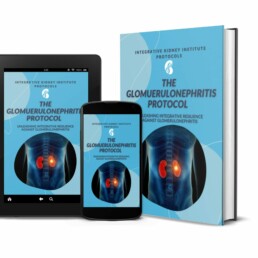We combed through multiple medical journals looking for the latest research on the Integrative approach to kidney health. We know your time is valuable, so we curated and summarized these studies for you. Welcome to the InKidney June Research and News.
June Research and News
DHA-Containing Diets May Halt the Progression of Kidney Disease
A new study in the journal Kidney360 offers compelling insights into the role of docosahexaenoic acid (DHA)-containing diets in attenuating renal failure.
The research team sought to examine the effects of arachidonic acid (ARA) and/or DHA on oxidative stress and fibrosis — two key factors that cause kidney injury in rats that underwent a 5/6 nephrectomy. The procedure, which involves the removal of a significant part of the kidney, often leads to increased urinary albumin excretion and eventual renal failure.
Sprague Dawley rats were divided into groups and fed either ARA, DHA, or both for four weeks post-nephrectomy. Researchers assessed urine, plasma, and kidney samples for signs of oxidative stress, inflammation, and fibrosis.
Findings revealed that nephrectomy induced a surge in urinary albumin excretion, indoxyl sulfate, reactive oxygen species, tumor necrosis factor-α levels, and kidney fibrosis. However, these factors were notably reduced when the rats were fed a DHA-containing diet.
DHA-containing diets could be a promising strategy to suppress the progression of kidney disease.
Join us to end the kidney disease epidemic and receive the FREE Report “5 Pitfalls to Avoid When Caring for Kidney Patients”
No Increased Risk of First-Time Symptomatic Kidney Stones from Outpatient Antibiotic Use
A recent population-based case-control study suggests that outpatient antibiotic use does not lead to an increased risk of a first-time symptomatic kidney stone episode. This conclusion runs contrary to the theory that antibiotics, which modify gastrointestinal and urinary microbiomes, could contribute to kidney stone formation.
The study, conducted in Olmsted County, Minnesota, from 2008-2013, involved 1,247 individuals with chart-validated, first-time symptomatic kidney stones, along with 4,024 age- and sex-matched controls.
Researchers analyzed all prescriptions for outpatient oral antibiotics used within the five years preceding the onset of symptomatic stones for both cases and their matched controls.
The findings revealed that the risk of symptomatic kidney stones only increased during the year following antibiotic use. This risk was less after adjusting for comorbidities. Moreover, upon excluding cases and controls with prior urinary symptoms (which could warrant antibiotic prescriptions due to undiagnosed kidney stones), no increased risk of symptomatic kidney stones was noted during the year after antibiotic use.
These outcomes remained consistent across different antibiotic classes and the number of antibiotic courses taken.
Accordingly, the study suggests that the perceived risk of first-time symptomatic kidney stones associated with antibiotics may be largely attributable to the presence of comorbidities and the prescription of antibiotics for urinary symptoms that may actually signal undiagnosed kidney stones, suggesting a case of reverse causality.
Of course, this study, as it is titled, does not address asymptomatic kidney stones or recurrent kidney stones. It also just appears that the researchers cherry-picked their exclusion criteria to get to the negative association.
Lower Incidence of Idiopathic Nephrotic Syndrome during Covid-19 Pandemic Lockdown – Viral Triggers?
This study is a hidden gem.
Here, researchers examined the incidence of “idiopathic” nephrotic syndrome (INS) during the Covid-19 pandemic, focusing on cohorts in the Netherlands and the Paris area from 2018-2021.
The findings indicated no significant difference in INS incidence before and during the pandemic. However, there was a lower incidence observed during periods when schools were closed.
Notably, during peak times of hospital admissions due to Covid-19, no new INS cases were reported.
The researchers concluded that: the lower incidence of INS, other respiratory viral infections, and reduced air pollution during lockdown suggest a potential link between INS onset and viral infections and/or environmental factors.
Very Low-Carbohydrate Diet Shows Greater Health Improvements Than DASH Diet for High-Risk Adults
A recent randomized trial compared the effects of a very low-carbohydrate (VLC) diet to the Dietary Approaches to Stop Hypertension (DASH) diet for adults with hypertension, prediabetes or type 2 diabetes, and overweight or obesity.
The study is relatively small. It included 94 adults from southeast Michigan and found that, compared to the DASH diet, the VLC diet resulted in greater improvements in systolic blood pressure, glycated hemoglobin (an indicator of blood sugar control), and weight loss over a four-month period.
Adding extra support strategies, such as mindful eating, positive emotion regulation, social support, and cooking, didn’t significantly affect the outcomes.
This suggests that the VLC diet might offer more effective disease management for this high-risk group than the DASH diet. We look forward to larger, longer-term studies in the near future to confirm these findings.
Join here to receive FREE monthly updates on the latest research in Integrative Nephrology and tips on managing kidney disease straight to your inbox.
We would love to hear your feedback. Let us know what you think of these educational materials and if you like us to focus on specific topics. Please email us at info@inkidney.com.






